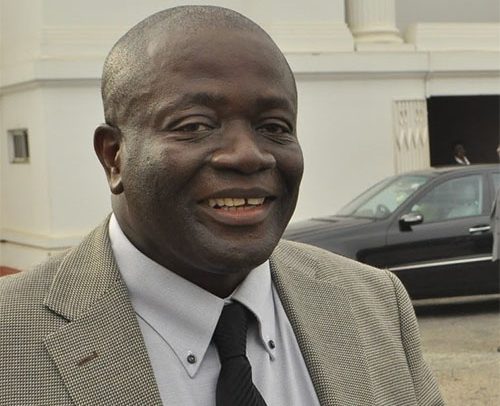Nii Amanor Dodoo
AN ACCRA High Court has ruled that the Receiver of defunct uniBank Ghana Limited, Nii Amanor Dodoo, is qualified as a competent and compellable witness to give evidence for the prosecution in the trial of former Finance Minister, Dr. Kwabena Duffuor who is also founder of the bank and eight others.
The court’s ruling followed applications by lawyers for the accused persons challenging the capacity of Mr. Dodoo as a witness for the prosecution on grounds that, he was a partner at KPMG when he was appointed as administrator of uniBank.
The court, presided over by Justice Bright Mensah, a Court of Appeal judge, sitting with additional responsibility, in its ruling, held that Mr. Dodoo had personal knowledge and could speak to the issues that came to his knowledge by reason of his appointment as Receiver of uniBank.
Trial
Dr. Duffuor and eight others are standing trial before an Accra High Court for their alleged ‘dishonest’ spending of over GH¢5.7 billion belonging to customers and investors of the insolvent private bank, now defunct.
Among those charged is the former 2nd Deputy Governor of the Bank of Ghana, Dr. Johnson Pandit Asiama, under whose watch over GH¢450 million was allegedly doled out to uniBank without following laid down procedures, the AG’s Department said.
Dr. Duffuor, Dr. Asiama, Kwabena Duffuor II, Ekow Nyarko Dadzie-Dennis, Elsie Dansoa Kyereh, Jeffrey Amon, Benjamin Ofori, and Kwadwo Opoku Okoh, are facing a total of 68 charges including fraudulent transactions and money laundering but they have all pleaded not guilty to the charges.
Objection
Lawyers for the accused persons filed motions objecting to the prosecution’s decision to call Mr. Dodoo as its first witness in the trial.
Osafo Buabeng, counsel for Dr. Kwabena Duffuor, HODA Holdings Limited and Kwabena Duffuor II, in his application, argued that Mr. Dodoo was a partner at KPMG, who was appointed the administrator of uniBank but the official administration ceased on July 30, 2018.
He said upon the dissolution of the administration, Mr. Dodoo was appointed the Receiver of uniBank on August 20, 2018 which flouts Section 122(8) of the Banks and Specialized Deposit-Taking Institutions Act (Act 930), thereby constituting an illegality.
He said Mr. Dodoo, who is a partner in KPMG, the official administrator, could not have subsequently been appointed the Receiver of uniBank within two years of the determination of the official administration of the bank.
He concluded that Mr. Dodoo’s appointment just a day after the administration ended was a nullity and all that he has done pursuant to his appointment was an illegality.
Lawyers for the other accused persons supported the argument of Mr. Buabeng and added that no court has the power to grant immunity for breach of statutes.
They also argued that the objection to the capacity or status of Mr. Dodoo also affects the admissibility of documents the witness seeks to tender in evidence during the trial.
Again, the defence counsels argued that per Section 52 of the Evidence Act and on grounds of public policy, the court has power to exclude an otherwise relevant evidence.
Opposition
The objection was opposed by the prosecution led by the Director of Public Prosecutions, Yvonne Atakora Obuobisa, who argued that though Mr. Dodoo was an employee of KPMG, he is distinct from the company.
She contended that Section 122 of Act 930 that the defence lawyers relied on, was not applicable to the witness.
She also argued that KPMG has not acquired any significant shares in uniBank and he (Dodoo) has not accepted an appointment in the bank as a Director, neither does he hold any key management position in uniBank.
She further said that KPMG has not flouted any laid down regulations or statutes.
Ms Obuobisa then referred to Section 124 of Act 930 that deals with the appointment of a Receiver and insisted that Mr. Dodoo is from the private sector stressing that his appointment was consistent with the law and therefore legitimate.
She concluded that the fact that Mr. Dodoo worked with KPMG and the company was later appointed as the official administrator of uniBank did not debar the Bank of Ghana from appointing him as Receiver of uniBank.
Ruling
Justice Bright Mensah, in his ruling, held that having regard to the fact that Mr. Dodoo was appointed upon determination of official administration of uniBank when the bank had been closed down, he holds the submission of the DPP that “it cannot by any stretch of imagination be said that his appointment as a receiver was illegal or void.”
“To all intents and purposes, the appointment by the Bank of Ghana was with due process of the law and therefore, valid,” he added.
Justice Mensah further held that Mr. Dodoo “has personal knowledge and can speak to the issues that came to his knowledge by reason of his appointment as Receiver of uniBank, and the evidence or information he gathered pursuant to an investigation team he put in place to look into the affairs and management of the bank, whose licence has been revoked at the time, by the Bank of Ghana.”
The court, therefore, overruled the objections and admitted the documents that Mr. Dodoo sought to tender in evidence.
BY Gibril Abdul Razak


